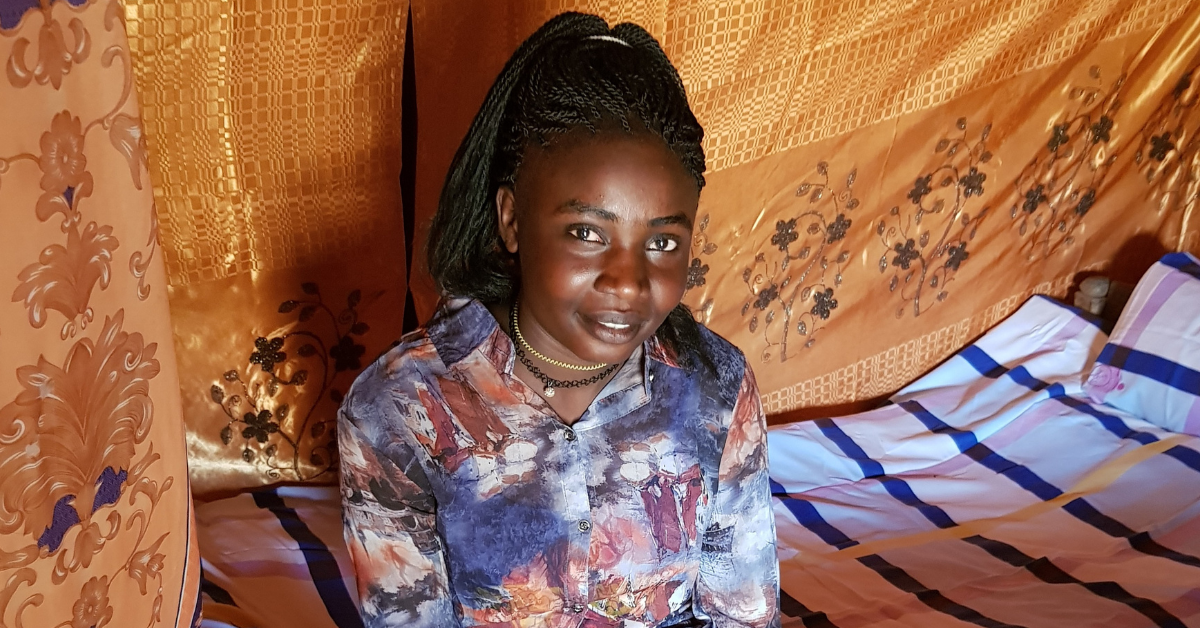
Broadcaster and journalist Susan Cahill visited South Sudan early in 2020, just before global Covid-19 travel restrictions came into place and closed the borders. Since then, lockdown measures and the danger of infection from the virus have made the lives of refugees in the country even more challenging.
“Basamat Alnoor Jakolo is tall and proud. She has big dreams for the future.
‘I would like to go to Uganda’, says Basamat, a 22-year-old Sudanese refugee from the Blue Nile region of Sudan. ‘It’s good in Uganda’.
It’s Sunday morning in late February and we are walking around the small market on Kaya refugee camp in Maban in South Sudan. It’s noisy; there are onions for sale, dried fish and not much else.
Maban is on the north-east of South Sudan and is one of the most isolated regions in the world. This marginalised area is home to Africa’s largest refugee crisis with over 160,000 refugees living across four UNHCR refugee camps – Doro, Batil, Kaya and Gendrassa. Basamat lives on Kaya refugee camp. Most of the refugees on Kaya do not have enough to eat and access to drinking water is very limited. Women and children make up most of the population.
The Jesuit Refugee Service in South Sudan
Since 2011, the Jesuit Refugee Service (JRS) has been working in Maban providing much needed humanitarian services to host and refugee communities.
On Doro, the largest of the camps, the JRS runs a day care centre for disabled children, a counselling and psychosocial support clinic for women and youths and a range of home visits programmes for the disabled and elderly. Added to this, is an impressive teacher training centre close to the town of Bunj, the capital of Maban County.
Last February, I volunteered with Tony O’ Riordan SJ in Maban and was supported by Noelle Fitzpatrick, the JRS County Director in South Sudan.
As we walk through the market, Basamat introduces me to a few of her friends and then to her father Alnoor Jakolo, who runs a small stall. Alnoor greets me with a warm smile and tells me how proud he is of his daughter and the education she has received.
“There are very few female teachers on the refugee camp. My daughter is a role model for all the girls on the camp”, he said.
Water shortages on Kaya Refugee Camp
It’s hot and dusty on Kaya. We walk down to one of the camp’s water pumps. All you can see are rows of empty jerry cans.
‘The problem here on Kaya is shortage of water. We have no water. We used to have water for two hours a day, but now with the water shortages women are buying water in the market. The women here on Kaya sometimes have to walk for over an hour with two jerry cans to get water’.
Basamat is from the Ingessana tribe. In 2011, Basamat fled her village in Sudan with her parents and siblings.
‘We had to walk for over three months. It was very difficult’, she said. ‘There was no education on the camp or anything to do, so I started teaching some of the children songs and games’.
In 2018, Basamat completed a Certificate in Education with the Jesuit Refugee Service, blazing a trail for all the young women and girls in Maban.
‘I am the only one in my family to go to my school. Some of my brothers went to school but they dropped out.’
‘Now that I am a teacher, I am respected by everybody in my community.’
We walk down to Basamat’s family compound on the corner of the refugee camp. Basamat points out her local Mosque in the distance. The mosque is made of mud and bamboo. I meet Basamat’s local Imam. He quizzes me about life in Ireland. I can hear African reggae music in the background. I move my feet to the beat. She laughs.
Climate Change in South Sudan
Basamat’s home is a series of five mud huts known locally as ‘tukuls’ surrounded by a bamboo wall. We have sweet peppermint tea. There are lots of children playing in the dust and sand. I meet Basamat’s sisters and aunts. All the women are beautifully dressed in bright fabrics of green, yellow and red. I look down at my dirty feet and laugh. How do these women stay so clean? They are amazing!
‘Since the JRS have come to Maban they have done a lot’, says one of Basamat’s aunts. ‘Before most of the women here could not read or write. Now some of us can.’
‘The climate is changing, last October the camp was completely flooded, we lost a lot. There was water everywhere. Some of our villagers had to move to higher ground’, said Basamat.
‘I don’t know what we will do if we get more floods, it’s very worrying.’
My satellite phone beeps; it’s Tony O Riordan SJ. It’s time to go.
I ask Basamat, will she return home to Sudan?
‘I will not return to Sudan – it is not possible’ she replies.
I leave Basamat and walk over to the jeep. I wonder about her future and all the challenges she faces. She has so much going for her. She’s smart, funny and ambitious. But despite all her abilities, she is vulnerable. Basamat is a refugee and like so many refugees around the world – not all of their dreams will come true.”
Author: Susan Cahill

